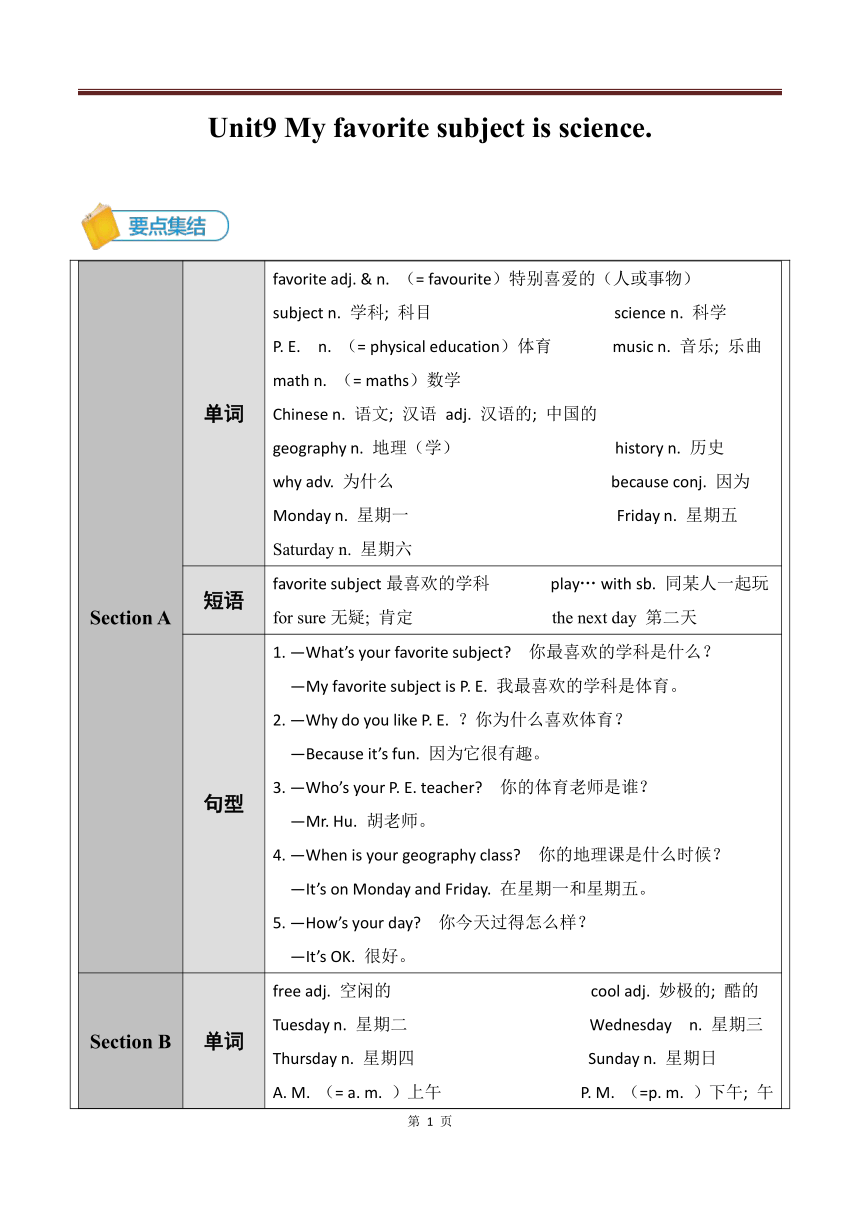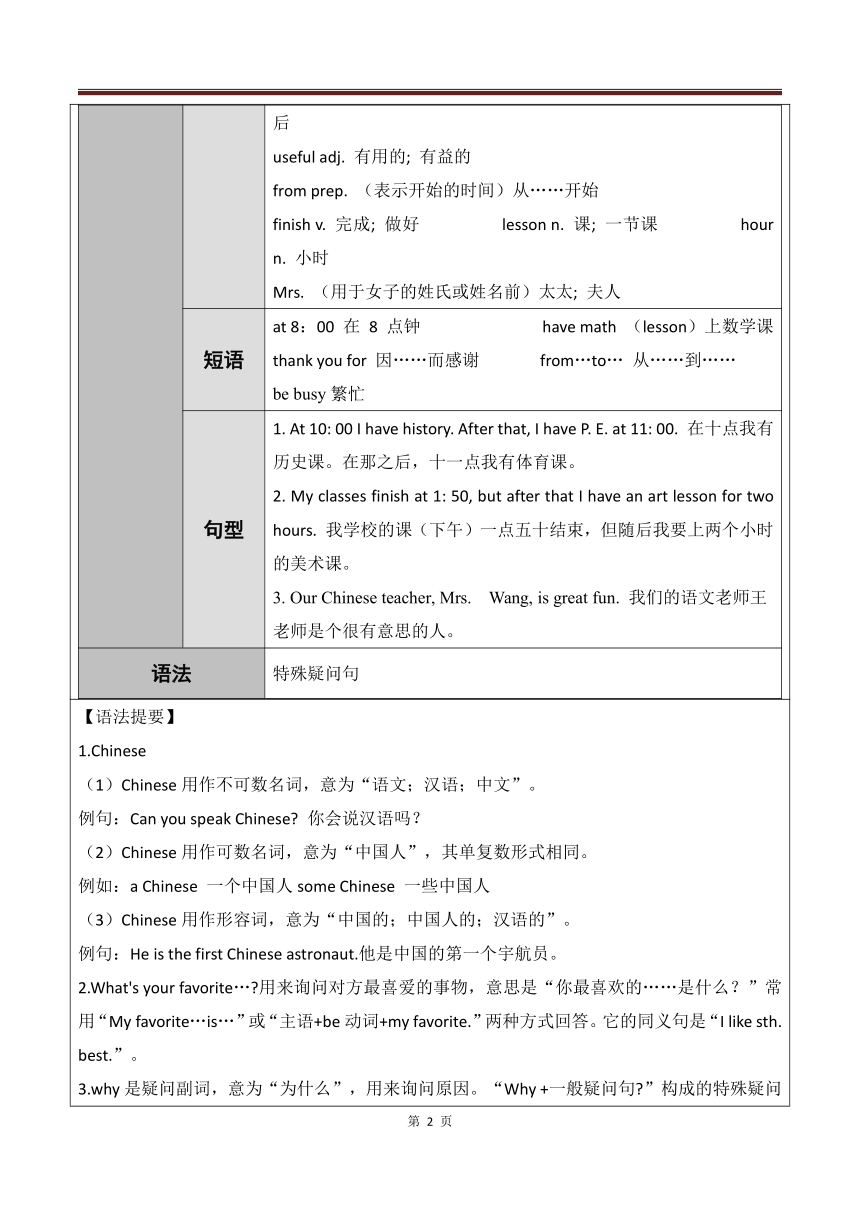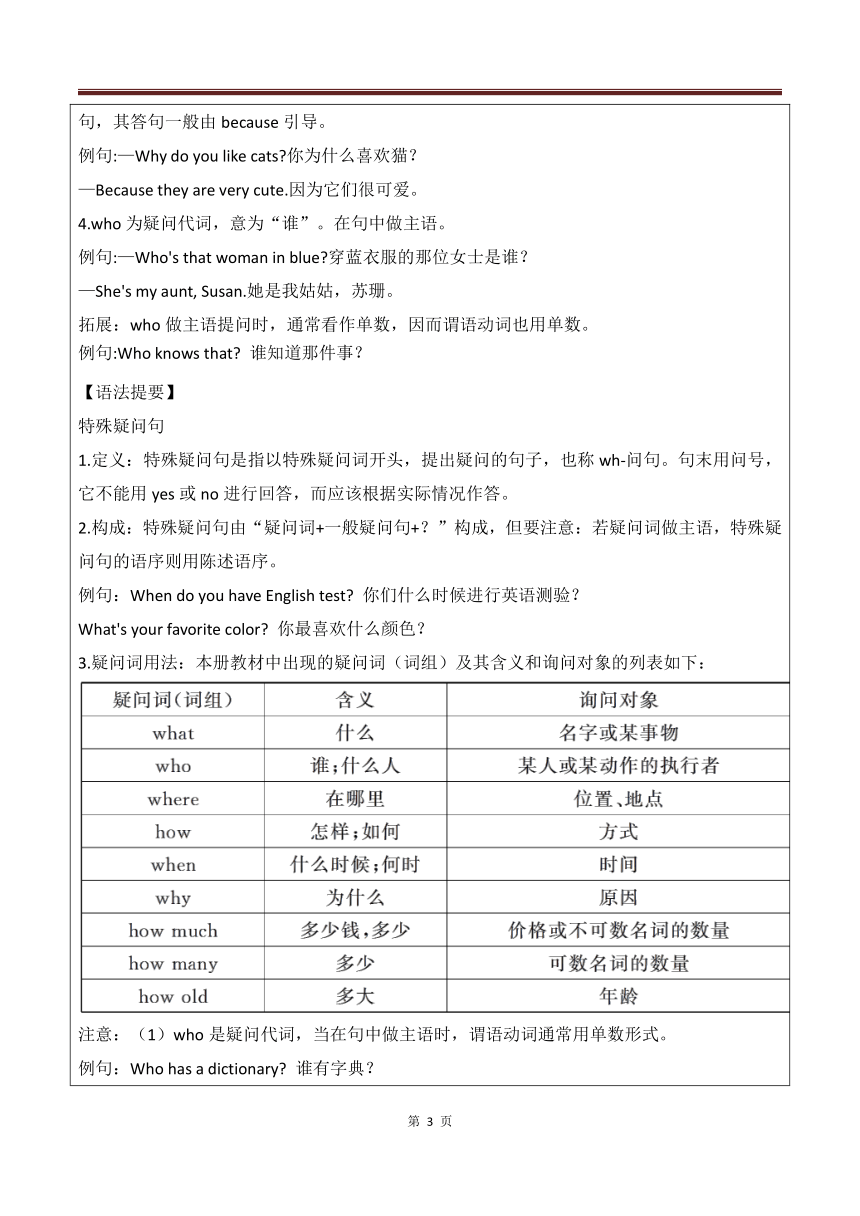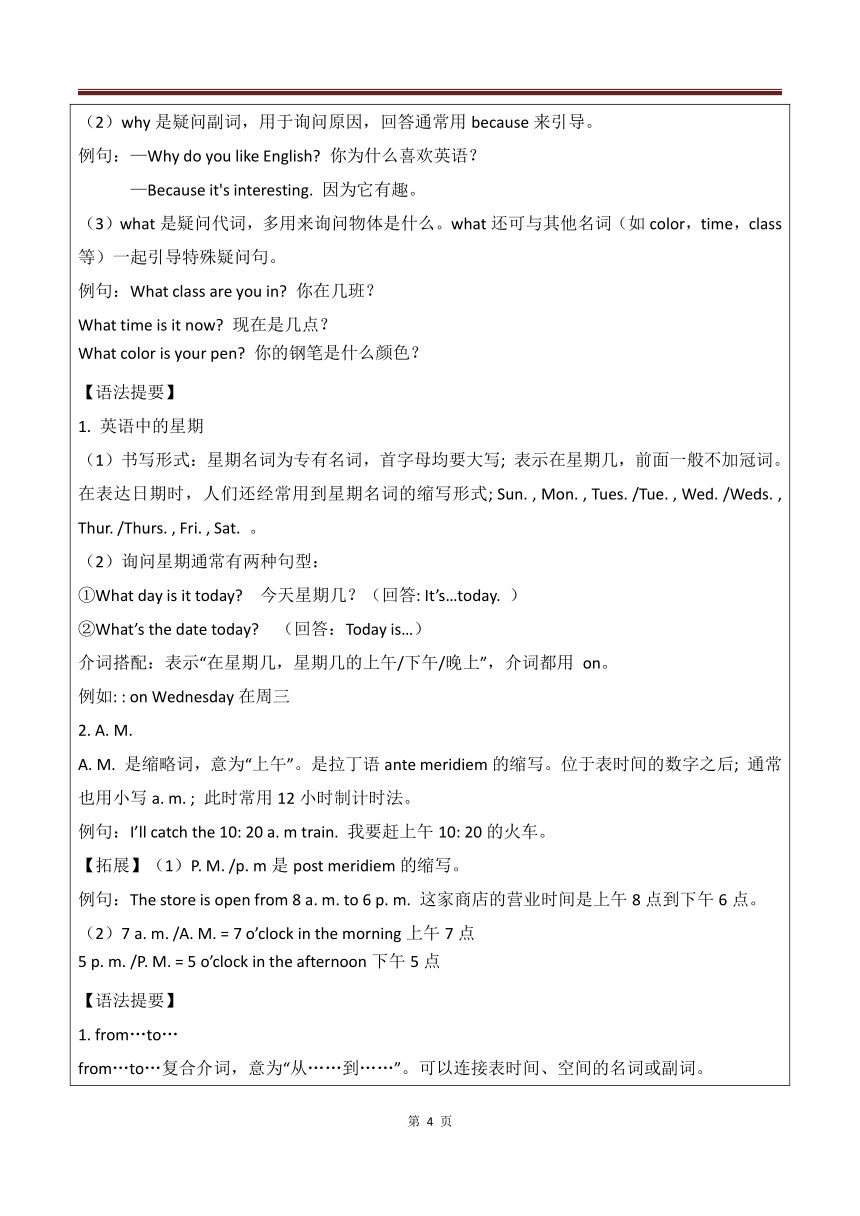Unit9 My favorite subject is science 知识点归纳.
文档属性
| 名称 | Unit9 My favorite subject is science 知识点归纳. |  | |
| 格式 | docx | ||
| 文件大小 | 104.4KB | ||
| 资源类型 | 教案 | ||
| 版本资源 | 人教新目标(Go for it)版 | ||
| 科目 | 英语 | ||
| 更新时间 | 2021-09-07 22:07:17 | ||
图片预览




文档简介
Unit9
My
favorite
subject
is
science.
Section
A单词favorite
adj.
&
n.
(=
favourite)特别喜爱的(人或事物)
subject
n.
学科;
科目
science
n.
科学
P.
E.
n.
(=
physical
education)体育
music
n.
音乐;
乐曲
math
n.
(=
maths)数学
Chinese
n.
语文;
汉语
adj.
汉语的;
中国的
geography
n.
地理(学)
history
n.
历史
why
adv.
为什么
because
conj.
因为
Monday
n.
星期一
Friday
n.
星期五
Saturday
n.
星期六短语favorite
subject最喜欢的学科
play…
with
sb.
同某人一起玩
for
sure无疑;
肯定
the
next
day
第二天句型1.
—What’s
your
favorite
subject?
你最喜欢的学科是什么?
—My
favorite
subject
is
P.
E.
我最喜欢的学科是体育。
2.
—Why
do
you
like
P.
E.
?你为什么喜欢体育?
—Because
it’s
fun.
因为它很有趣。
3.
—Who’s
your
P.
E.
teacher?
你的体育老师是谁?
—Mr.
Hu.
胡老师。
4.
—When
is
your
geography
class?
你的地理课是什么时候?
—It’s
on
Monday
and
Friday.
在星期一和星期五。
5.
—How’s
your
day?
你今天过得怎么样?
—It’s
OK.
很好。Section
B单词free
adj.
空闲的
cool
adj.
妙极的;
酷的
Tuesday
n.
星期二
Wednesday
n.
星期三
Thursday
n.
星期四
Sunday
n.
星期日
A.
M.
(=
a.
m.
)上午
P.
M.
(=p.
m.
)下午;
午后
useful
adj.
有用的;
有益的
from
prep.
(表示开始的时间)从……开始
finish
v.
完成;
做好
lesson
n.
课;
一节课
hour
n.
小时
Mrs.
(用于女子的姓氏或姓名前)太太;
夫人短语at
8:00
在
8
点钟
have
math
(lesson)上数学课
thank
you
for
因……而感谢
from…to…
从……到……
be
busy繁忙句型1.
At
10:
00
I
have
history.
After
that,
I
have
P.
E.
at
11:
00.
在十点我有历史课。在那之后,十一点我有体育课。
2.
My
classes
finish
at
1:
50,
but
after
that
I
have
an
art
lesson
for
two
hours.
我学校的课(下午)一点五十结束,但随后我要上两个小时的美术课。
3.
Our
Chinese
teacher,
Mrs.
Wang,
is
great
fun.
我们的语文老师王老师是个很有意思的人。语法特殊疑问句
【语法提要】
1.Chinese
(1)Chinese用作不可数名词,意为“语文;汉语;中文”。
例句:Can
you
speak
Chinese?
你会说汉语吗?
(2)Chinese用作可数名词,意为“中国人”,其单复数形式相同。
例如:a
Chinese
一个中国人some
Chinese
一些中国人
(3)Chinese用作形容词,意为“中国的;中国人的;汉语的”。
例句:He
is
the
first
Chinese
astronaut.他是中国的第一个宇航员。
2.What's
your
favorite…?用来询问对方最喜爱的事物,意思是“你最喜欢的……是什么?”常用“My
favorite…is…”或“主语+be动词+my
favorite.”两种方式回答。它的同义句是“I
like
sth.
best.”。
3.why是疑问副词,意为“为什么”,用来询问原因。“Why
+一般疑问句?”构成的特殊疑问句,其答句一般由because引导。
例句:—Why
do
you
like
cats?你为什么喜欢猫?
—Because
they
are
very
cute.因为它们很可爱。
4.who为疑问代词,意为“谁”。在句中做主语。
例句:—Who's
that
woman
in
blue?穿蓝衣服的那位女士是谁?
—She's
my
aunt,
Susan.她是我姑姑,苏珊。
拓展:who做主语提问时,通常看作单数,因而谓语动词也用单数。
例句:Who
knows
that?
谁知道那件事?
【语法提要】
特殊疑问句
1.定义:特殊疑问句是指以特殊疑问词开头,提出疑问的句子,也称wh-问句。句末用问号,它不能用yes或no进行回答,而应该根据实际情况作答。
2.构成:特殊疑问句由“疑问词+一般疑问句+?”构成,但要注意:若疑问词做主语,特殊疑问句的语序则用陈述语序。
例句:When
do
you
have
English
test?
你们什么时候进行英语测验?
What's
your
favorite
color?
你最喜欢什么颜色?
3.疑问词用法:本册教材中出现的疑问词(词组)及其含义和询问对象的列表如下:
注意:(1)who是疑问代词,当在句中做主语时,谓语动词通常用单数形式。
例句:Who
has
a
dictionary?
谁有字典?
(2)why是疑问副词,用于询问原因,回答通常用because来引导。
例句:—Why
do
you
like
English?
你为什么喜欢英语?
—Because
it's
interesting.
因为它有趣。
(3)what是疑问代词,多用来询问物体是什么。what还可与其他名词(如color,time,class等)一起引导特殊疑问句。
例句:What
class
are
you
in?
你在几班?
What
time
is
it
now?
现在是几点?
What
color
is
your
pen?
你的钢笔是什么颜色?
【语法提要】
1.
英语中的星期
(1)书写形式:星期名词为专有名词,首字母均要大写;
表示在星期几,前面一般不加冠词。在表达日期时,人们还经常用到星期名词的缩写形式;
Sun.
,
Mon.
,
Tues.
/Tue.
,
Wed.
/Weds.
,
Thur.
/Thurs.
,
Fri.
,
Sat.
。
(2)询问星期通常有两种句型:
①What
day
is
it
today?
今天星期几?(回答:
It’s…today.
)
②What’s
the
date
today?
(回答:Today
is…)
介词搭配:表示“在星期几,星期几的上午/下午/晚上”,介词都用
on。
例如:
:
on
Wednesday在周三
2.
A.
M.
A.
M.
是缩略词,意为“上午”。是拉丁语ante
meridiem的缩写。位于表时间的数字之后;
通常也用小写a.
m.
;
此时常用12小时制计时法。
例句:I’ll
catch
the
10:
20
a.
m
train.
我要赶上午10:
20的火车。
【拓展】(1)P.
M.
/p.
m是post
meridiem的缩写。
例句:The
store
is
open
from
8
a.
m.
to
6
p.
m.
这家商店的营业时间是上午8点到下午6点。
(2)7
a.
m.
/A.
M.
=
7
o’clock
in
the
morning上午7点
5
p.
m.
/P.
M.
=
5
o’clock
in
the
afternoon下午5点
【语法提要】
1.
from…to…
from…to…复合介词,意为“从……到……”。可以连接表时间、空间的名词或副词。
例句:I’ll
wait
for
him
from
today
to
tomorrow.
我会从今天到明天一直等他。
It’s
quite
far
from
her
home
to
her
school.
从她家到她学校很远。
2.
after
that
after
that意为“在那之后;然后”,相当于then。其中after为介词,意为“在……之后”;
that是代词,指代前面的某一件事。
例句:He
has
an
egg
and
some
bread
for
breakfast.
After
that
he
goes
to
school.
他早餐吃了一个鸡蛋和一些面包。然后就上学去了。(指“他吃早饭”这件事之后)
I
finished
my
homework
at
9:
30.
After
that
I
watched
Night
News
for
a
while.
我9∶30做完了作业,然后看了会儿晚间新闻。
3.
finish
finish为不及物动词,意为“结束、完成”。
例句:All
my
homework
finishes
at
around
10:
00
p.
m.
我所有的作业大约在晚上10:
00完成。
【拓展】finish
还可作及物动词,其后接名词或动名词。意为“做完某事”。
例句:They
finished
their
talk
at
9:
30.
他们9:
30就结束了谈话。
I
finished
cleaning
the
house
alone.
我独自打扫了房子。
4.
for
+一段时间
for
two
hours
意为“两小时”。“for
+
一段时间”意为“长达……”。对for短语提问时,用how
long,意为“多久”。
例句:We
practice
speaking
English
for
more
than
20
minutes
every
day.
我们每天练说英语(达)20多分钟。
—How
long
have
you
known
Mr.
Wang?
你认识王先生多久了?
—For
nearly
10
years.
近10年了。
【语法提要】
“Is
that
OK
with
you?
”用来征求对方的意见,意为“那对你来说合适吗?/你看可以吗?”其中that指代所征求意见的内容,依据上下文的不同也可使用this或it。
例句:Let’s
go
to
the
zoo.
Is
that
OK
with
you?
我们去动物园吧。你看可以吗?
Let’s
eat
noodles
for
lunch.
Is
that
OK
with
you?
中午吃面条。你看可以吗?
1.
my
favorite
subject
我最喜欢的科目2.
have
P.
E.
/
a
P.
E.
lesson上体育课3.
play
games
with
us和我们一起玩游戏4.
my
science
teacher我的科学老师5.
your
favorite
day你最喜欢的一天6.
the
next
day第二天7.
David’s
favorite
subject戴维最喜欢的科目8.
on
Friday在周五9.
on
Friday
morning/
afternoon/
evening
在周五早上,下午,晚上10.
from
12:00
to
1:00从1
2
:0
0到(下午)1
:0
011.
after
that自那以后12.
great
fun非常有趣13.
difficult
but
interesting难但是有趣句型1.
What’s
your
favorite
subject?
你最喜欢的科目是什么?2.
My
favorite
subject
is
math.
我最喜欢的科目是数学。3.What
s
her/his
favorite
subject?她/他最喜欢的科目是什么:4.-
Why
do
you
like
science?
你为什么喜欢科学?5.
Why
does
he
like
P.
E.
?
他为什么喜欢体育?6.
Who’s
your
P.
E.
teacher?
谁是你的体育老师?7.Who
is
your
favorite
teacher?你最喜欢的老师是谁?8.
How’s
your
day?
你今天如何?9.
When
is
your
geography
class?
你的地理课是什么时候?10.
I
like
Monday
because
I
have
P.
E.
and
history.我喜欢周一,因为我可以上体育和历史课。11.
I
think
history
is
interesting.
我认为历史很有趣。12.
The
teacher
says
it
is
useful,
but
I
think
it
is
difficult.老师说这很有用,但我认为这很难。13.
I
am
very
busy
on
Friday.
在周五,我非常忙。14.
After
that,I
have
an
art
lesson
for
two
hours.然后(在那之后)我上两个小时的美术课。15.
Lunch
is
from
12:00
to
1:00.
中饭时间是1
2
:0
0到(下午)1
:0
0。16.
My
classes
finish
at
1
:
50.
我的课1
:5
0结束。17.
Let's
meet
on
Saturday.
Is
that
OK
with
you?让我们周六见。你方便吗?
My
favorite
subject
is
science.
Section
A单词favorite
adj.
&
n.
(=
favourite)特别喜爱的(人或事物)
subject
n.
学科;
科目
science
n.
科学
P.
E.
n.
(=
physical
education)体育
music
n.
音乐;
乐曲
math
n.
(=
maths)数学
Chinese
n.
语文;
汉语
adj.
汉语的;
中国的
geography
n.
地理(学)
history
n.
历史
why
adv.
为什么
because
conj.
因为
Monday
n.
星期一
Friday
n.
星期五
Saturday
n.
星期六短语favorite
subject最喜欢的学科
play…
with
sb.
同某人一起玩
for
sure无疑;
肯定
the
next
day
第二天句型1.
—What’s
your
favorite
subject?
你最喜欢的学科是什么?
—My
favorite
subject
is
P.
E.
我最喜欢的学科是体育。
2.
—Why
do
you
like
P.
E.
?你为什么喜欢体育?
—Because
it’s
fun.
因为它很有趣。
3.
—Who’s
your
P.
E.
teacher?
你的体育老师是谁?
—Mr.
Hu.
胡老师。
4.
—When
is
your
geography
class?
你的地理课是什么时候?
—It’s
on
Monday
and
Friday.
在星期一和星期五。
5.
—How’s
your
day?
你今天过得怎么样?
—It’s
OK.
很好。Section
B单词free
adj.
空闲的
cool
adj.
妙极的;
酷的
Tuesday
n.
星期二
Wednesday
n.
星期三
Thursday
n.
星期四
Sunday
n.
星期日
A.
M.
(=
a.
m.
)上午
P.
M.
(=p.
m.
)下午;
午后
useful
adj.
有用的;
有益的
from
prep.
(表示开始的时间)从……开始
finish
v.
完成;
做好
lesson
n.
课;
一节课
hour
n.
小时
Mrs.
(用于女子的姓氏或姓名前)太太;
夫人短语at
8:00
在
8
点钟
have
math
(lesson)上数学课
thank
you
for
因……而感谢
from…to…
从……到……
be
busy繁忙句型1.
At
10:
00
I
have
history.
After
that,
I
have
P.
E.
at
11:
00.
在十点我有历史课。在那之后,十一点我有体育课。
2.
My
classes
finish
at
1:
50,
but
after
that
I
have
an
art
lesson
for
two
hours.
我学校的课(下午)一点五十结束,但随后我要上两个小时的美术课。
3.
Our
Chinese
teacher,
Mrs.
Wang,
is
great
fun.
我们的语文老师王老师是个很有意思的人。语法特殊疑问句
【语法提要】
1.Chinese
(1)Chinese用作不可数名词,意为“语文;汉语;中文”。
例句:Can
you
speak
Chinese?
你会说汉语吗?
(2)Chinese用作可数名词,意为“中国人”,其单复数形式相同。
例如:a
Chinese
一个中国人some
Chinese
一些中国人
(3)Chinese用作形容词,意为“中国的;中国人的;汉语的”。
例句:He
is
the
first
Chinese
astronaut.他是中国的第一个宇航员。
2.What's
your
favorite…?用来询问对方最喜爱的事物,意思是“你最喜欢的……是什么?”常用“My
favorite…is…”或“主语+be动词+my
favorite.”两种方式回答。它的同义句是“I
like
sth.
best.”。
3.why是疑问副词,意为“为什么”,用来询问原因。“Why
+一般疑问句?”构成的特殊疑问句,其答句一般由because引导。
例句:—Why
do
you
like
cats?你为什么喜欢猫?
—Because
they
are
very
cute.因为它们很可爱。
4.who为疑问代词,意为“谁”。在句中做主语。
例句:—Who's
that
woman
in
blue?穿蓝衣服的那位女士是谁?
—She's
my
aunt,
Susan.她是我姑姑,苏珊。
拓展:who做主语提问时,通常看作单数,因而谓语动词也用单数。
例句:Who
knows
that?
谁知道那件事?
【语法提要】
特殊疑问句
1.定义:特殊疑问句是指以特殊疑问词开头,提出疑问的句子,也称wh-问句。句末用问号,它不能用yes或no进行回答,而应该根据实际情况作答。
2.构成:特殊疑问句由“疑问词+一般疑问句+?”构成,但要注意:若疑问词做主语,特殊疑问句的语序则用陈述语序。
例句:When
do
you
have
English
test?
你们什么时候进行英语测验?
What's
your
favorite
color?
你最喜欢什么颜色?
3.疑问词用法:本册教材中出现的疑问词(词组)及其含义和询问对象的列表如下:
注意:(1)who是疑问代词,当在句中做主语时,谓语动词通常用单数形式。
例句:Who
has
a
dictionary?
谁有字典?
(2)why是疑问副词,用于询问原因,回答通常用because来引导。
例句:—Why
do
you
like
English?
你为什么喜欢英语?
—Because
it's
interesting.
因为它有趣。
(3)what是疑问代词,多用来询问物体是什么。what还可与其他名词(如color,time,class等)一起引导特殊疑问句。
例句:What
class
are
you
in?
你在几班?
What
time
is
it
now?
现在是几点?
What
color
is
your
pen?
你的钢笔是什么颜色?
【语法提要】
1.
英语中的星期
(1)书写形式:星期名词为专有名词,首字母均要大写;
表示在星期几,前面一般不加冠词。在表达日期时,人们还经常用到星期名词的缩写形式;
Sun.
,
Mon.
,
Tues.
/Tue.
,
Wed.
/Weds.
,
Thur.
/Thurs.
,
Fri.
,
Sat.
。
(2)询问星期通常有两种句型:
①What
day
is
it
today?
今天星期几?(回答:
It’s…today.
)
②What’s
the
date
today?
(回答:Today
is…)
介词搭配:表示“在星期几,星期几的上午/下午/晚上”,介词都用
on。
例如:
:
on
Wednesday在周三
2.
A.
M.
A.
M.
是缩略词,意为“上午”。是拉丁语ante
meridiem的缩写。位于表时间的数字之后;
通常也用小写a.
m.
;
此时常用12小时制计时法。
例句:I’ll
catch
the
10:
20
a.
m
train.
我要赶上午10:
20的火车。
【拓展】(1)P.
M.
/p.
m是post
meridiem的缩写。
例句:The
store
is
open
from
8
a.
m.
to
6
p.
m.
这家商店的营业时间是上午8点到下午6点。
(2)7
a.
m.
/A.
M.
=
7
o’clock
in
the
morning上午7点
5
p.
m.
/P.
M.
=
5
o’clock
in
the
afternoon下午5点
【语法提要】
1.
from…to…
from…to…复合介词,意为“从……到……”。可以连接表时间、空间的名词或副词。
例句:I’ll
wait
for
him
from
today
to
tomorrow.
我会从今天到明天一直等他。
It’s
quite
far
from
her
home
to
her
school.
从她家到她学校很远。
2.
after
that
after
that意为“在那之后;然后”,相当于then。其中after为介词,意为“在……之后”;
that是代词,指代前面的某一件事。
例句:He
has
an
egg
and
some
bread
for
breakfast.
After
that
he
goes
to
school.
他早餐吃了一个鸡蛋和一些面包。然后就上学去了。(指“他吃早饭”这件事之后)
I
finished
my
homework
at
9:
30.
After
that
I
watched
Night
News
for
a
while.
我9∶30做完了作业,然后看了会儿晚间新闻。
3.
finish
finish为不及物动词,意为“结束、完成”。
例句:All
my
homework
finishes
at
around
10:
00
p.
m.
我所有的作业大约在晚上10:
00完成。
【拓展】finish
还可作及物动词,其后接名词或动名词。意为“做完某事”。
例句:They
finished
their
talk
at
9:
30.
他们9:
30就结束了谈话。
I
finished
cleaning
the
house
alone.
我独自打扫了房子。
4.
for
+一段时间
for
two
hours
意为“两小时”。“for
+
一段时间”意为“长达……”。对for短语提问时,用how
long,意为“多久”。
例句:We
practice
speaking
English
for
more
than
20
minutes
every
day.
我们每天练说英语(达)20多分钟。
—How
long
have
you
known
Mr.
Wang?
你认识王先生多久了?
—For
nearly
10
years.
近10年了。
【语法提要】
“Is
that
OK
with
you?
”用来征求对方的意见,意为“那对你来说合适吗?/你看可以吗?”其中that指代所征求意见的内容,依据上下文的不同也可使用this或it。
例句:Let’s
go
to
the
zoo.
Is
that
OK
with
you?
我们去动物园吧。你看可以吗?
Let’s
eat
noodles
for
lunch.
Is
that
OK
with
you?
中午吃面条。你看可以吗?
1.
my
favorite
subject
我最喜欢的科目2.
have
P.
E.
/
a
P.
E.
lesson上体育课3.
play
games
with
us和我们一起玩游戏4.
my
science
teacher我的科学老师5.
your
favorite
day你最喜欢的一天6.
the
next
day第二天7.
David’s
favorite
subject戴维最喜欢的科目8.
on
Friday在周五9.
on
Friday
morning/
afternoon/
evening
在周五早上,下午,晚上10.
from
12:00
to
1:00从1
2
:0
0到(下午)1
:0
011.
after
that自那以后12.
great
fun非常有趣13.
difficult
but
interesting难但是有趣句型1.
What’s
your
favorite
subject?
你最喜欢的科目是什么?2.
My
favorite
subject
is
math.
我最喜欢的科目是数学。3.What
s
her/his
favorite
subject?她/他最喜欢的科目是什么:4.-
Why
do
you
like
science?
你为什么喜欢科学?5.
Why
does
he
like
P.
E.
?
他为什么喜欢体育?6.
Who’s
your
P.
E.
teacher?
谁是你的体育老师?7.Who
is
your
favorite
teacher?你最喜欢的老师是谁?8.
How’s
your
day?
你今天如何?9.
When
is
your
geography
class?
你的地理课是什么时候?10.
I
like
Monday
because
I
have
P.
E.
and
history.我喜欢周一,因为我可以上体育和历史课。11.
I
think
history
is
interesting.
我认为历史很有趣。12.
The
teacher
says
it
is
useful,
but
I
think
it
is
difficult.老师说这很有用,但我认为这很难。13.
I
am
very
busy
on
Friday.
在周五,我非常忙。14.
After
that,I
have
an
art
lesson
for
two
hours.然后(在那之后)我上两个小时的美术课。15.
Lunch
is
from
12:00
to
1:00.
中饭时间是1
2
:0
0到(下午)1
:0
0。16.
My
classes
finish
at
1
:
50.
我的课1
:5
0结束。17.
Let's
meet
on
Saturday.
Is
that
OK
with
you?让我们周六见。你方便吗?
同课章节目录
- starters 预备篇(2012秋审查)
- Unit 1 Good morning !
- Unit 2 What’s this in English?
- Unit 3 What color is it ?
- Unit 1 My name's Gina.
- Section A
- Section B
- Unit 2 This is my sister.
- Section A
- Section B
- Unit 3 Is this your pencil?
- Section A
- Section B
- Unit 4 Where's my schoolbag?
- Section A
- Section B
- Unit 5 Do you have a soccer ball?
- Section A
- Section B
- Unit 6 Do you like bananas?
- Section A
- Section B
- Unit 7 How much are these socks?
- Section A
- Section B
- Unit 8 When is your birthday?
- Section A
- Section B
- Unit 9 My favorite subject is science.
- Section A
- Section B
